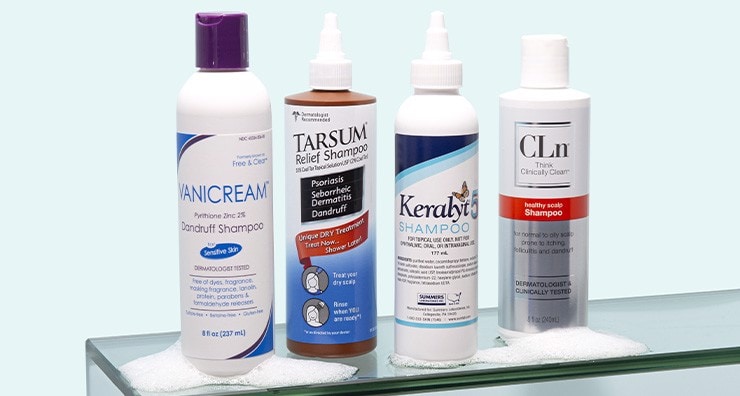
About the Author
Jill is a content writer for LovelySkin. She loves reading up on the latest beauty trends, going to concerts with her husband and baking with her three kids.
Other Posts by JillWelcome to LovelySkin.com.

Lumps, bumps and sores on the scalp are common occurrences for many people. They can range in size and shape and can be attributed to a variety of conditions. In some instances, sores on the scalp can be painful, itchy and just plain irritating. More seriously, sores on the scalp can be cancerous and might require immediate evaluation and treatment by a board-certified dermatologist.
If you’ve ever had scalp tenderness and wondered why, we can help you navigate what to do next. Follow along as we answer questions such as:
There are a number of reasons why scalps can get itchy and tender or why sores on the scalp might develop. They are typically covered by hair, making scalp sores difficult to see clearly on your own.
“If you have sores on your scalp—or anywhere on your skin for that matter—that aren’t healing, you should schedule an evaluation with your dermatologist,” says LovelySkin CEO Dr. Joel Schlessinger, board-certified dermatologist, Mohs surgeon and cosmetic surgeon. “Certain skin cancers like basal cell carcinoma or squamous cell carcinoma can look and feel like open or oozing sores and can be scaly or crusty. While this can also happen with other types of scalp sores from infections to infestations, it takes the expertise of a dermatologist for diagnosis. It’s best not to ignore them and seek treatment.”
If your dermatologist has ruled out skin cancer, here are a few other possible causes for scalp tenderness, redness or itchiness.
Psoriasis is a skin condition that often affects the whole body and is thought to be attributed to an overactive immune system that produces skin cells too quickly. This buildup of skin cells often presents itself as rough, itchy, scaly patches on the skin that can be white, silvery or red in color. Psoriasis patches often occur on the elbows and knees but can also show up on the scalp. Shampoos with coal tar or salicylic acid are commonly recommended to help ease the symptoms of scalp psoriasis.
Folliculitis occurs when a hair follicle becomes infected by bacteria, creating a lump or sore on the scalp. This may result in a red, painful bump that appears like a scab. Sometimes, these types of sores on the scalp can heal without treatment, but in other cases, antibiotics are required. For immediate relief, try pressing a warm washcloth on the infected hair follicle to ease any pain and swelling.
Seborrheic dermatitis is a form of eczema that creates rough patches on the skin, and when it presents on the scalp, it is more commonly known as dandruff. These itchy, rough patches may flake off the scalp and onto the hair. There are a number of ways to treat dandruff depending on its severity, including using a scalp cleanser formulated with pyrithione zinc, salicylic acid or coal tar.
Allergic reactions, also known as contact dermatitis, in the skin can happen anywhere on the body, including on the scalp. It’s possible for an ingredient in shampoo, styling products or hair color treatments to cause an allergic reaction that results in red, itchy, inflamed sores on the scalp.
To help reduce symptoms, try your best not to scratch these sores as it will only exacerbate the problem. Instead, try using a hydrocortisone product(see FixMySkin below) to help relieve the itching and heal inflammation.
Shingles is also a possibility. The CDC reports more than 33% of people in the United States will develop shingles at some point in their life.
Shingles consists of a painful rash that progresses into blisters that can scab over. The rash is often preceded by pain, itching and tingling in the area where the rash develops. They can occur on the skin anywhere on the body, including the face and scalp. Shingles often heal within two to four weeks, but if the symptoms are too much to bear, prescribed antiviral medications could help.
Are you noticing a sore scalp with hair loss? Lichen planopilaris is a rare type of alopecia thought to be related to certain autoimmune diseases. This condition may lead to patchy hair loss with scaling and redness around the hair follicles. As a result, the scalp can lose its ability to regrow hair. Prescription anti-inflammatory treatments provided by a dermatologist are often the best course of treatment.
Dermatitis herpetiformis is a condition that can cause sores on the scalp or a bumpy, itchy rash thought to be related to celiac disease or gluten intolerance. While this skin condition rarely presents itself on the scalp, it can happen and is more frequently an issue for men.
Before you start any treatment for scalp sores or scalp tenderness, consult a board-certified dermatologist for the correct diagnosis.
“A dermatologist can determine whether a topical, over-the-counter shampoo can help treat and prevent sores on the scalp, or they can prescribe a higher-strength treatment, such as an oral antibiotic or antifungal medication, if needed,” says LovelySkin Medical Director Dr. Daniel Schlessinger, board-certified dermatologist, Mohs surgeon and cosmetic surgeon. “Most importantly, they can determine if your scalp sores might actually be abnormal moles that need removal. By starting with a dermatologist, you can save time and money by picking the correct scalp sores treatment, rather than going through multiple options before finding something that works.”
Once you have a diagnosis, here are some over-the-counter scalp treatments that your dermatologist might recommend.
This powerful formula can be used as both a shampoo and a scalp treatment to heal and prevent sores caused by psoriasis or seborrheic dermatitis (dandruff). It uses 2% coal tar to help the scalp shed dead skin cells while slowing down the growth of new cells. Salicylic acid further encourages active exfoliation for a smoother, healthier scalp.
Ideal for those who are struggling with scalp scaling due to psoriasis or seborrheic dermatitis, this exfoliating shampoo contains 5% salicylic acid to help clear up symptoms such as dryness, roughness and itchiness on the scalp.
If you suffer from folliculitis or mild dandruff, this bleach-based shampoo will help eliminate bacteria that contributes to these types of scalp conditions. Salicylic acid exfoliates dead skin cells, which helps minimize flaking and itching.
For moderate to severe cases of seborrheic dermatitis on the scalp, also known as dandruff, this shampoo features the maximum level pyrithione zinc available without a prescription. This antibacterial ingredient helps treat dandruff as well as eczema and psoriasis on the scalp.
If you deal with eczema or psoriasis on the scalp in addition to other parts of your body, this multitasking oatmeal bar soap may be your answer to how to get rid of eczema symptoms. It can be used anywhere on the body and features 2% pyrithione zinc to provide anti-inflammatory benefits while helping reinforce and strengthen the skin’s protective barrier to help relieve itching.
If you think the sores on your scalp are due to an allergic reaction to shampoo or contact dermatitis, a hydrocortisone treatment might help.
This pocket-sized balm is crafted with 1% hydrocortisone to heal any irritation as well as shea butter to help keep skin soft and comfortable. This versatile healing balm can be used anywhere on the skin, including the scalp. However, Drs. Joel and Daniel Schlessinger note it could leave hair feeling greasy and may be best used on bald heads.
This plant oil-based scalp treatment was designed by botanical hair care company PHYTO to help soothe dry, irritated and itchy scalps. Dr. Joel Schlessinger recommends it for cases of seborrheic dermatitis or dandruff on the scalp. Its blend of oils—rosemary, citrus, cypress and eucalyptus—helps balance oil and reduce irritation.
Are ingrown hairs an issue for you after shaving? You can read about the best ingrown hair products on the LovelySkin Blog.
Follow us on social networks and be one of the first to learn about sales, giveaways, and free samples
| Mon - Fri | 9 - 5 p.m. CT |
|---|---|
| Sat (chat only) | 9 - 3 p.m. CT |
| Sun / Holidays | Closed |
| Call or Text: | 402-697-1100 |
|---|